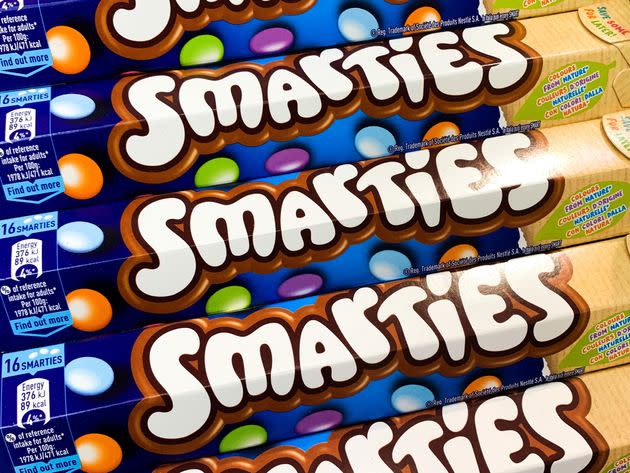I Just Realised What 'Smarties' Stands For, And It's Not What I Thought

We’ve written before at HuffPost UK about how Hobnobs, Bourbons, and Twix all got their names.
We’ve even shared why Yorkies, which actually only weigh a gram more than Dairy Milk, are cleverly shaped to their chunkier form.
But all that confectionary info hasn’t taught us yet how Smarties, a British sweeties staple, got their name ― after all, nobody eats them to get cleverer.
And?
And the chocolate is much older than you probably think. It was made by Rowntrees, now owned by Nestlé, in 1882, and originally went by the name Chocolate Beans.
That makes Smarties ― the actual sweets, if not their name ― exactly 100 years older than Ciabatta.
The sweets have gone in and out of production since, going into hibernation alongside Aero and KitKat during the war.
The UK versions became Smarties in 1937 because, as food historian Ivan Day told the BBC, Rowntrees’ marketing director George Harris returned from a trip to the United States inspired by the characterful names companies gave their products.
“Until that point, our chocolates were named after royalty ― Queen’s Chocolate, Emperor’s Chocolate, etc. But Harris wanted to give things a personality,” he said.
So “Rowntrees Clear Gums became Fruit Gums, Aerated Chocolate became Aero, Chocolate Crisp became KitKat”.
This led Harris to rebrand Smarties too, perhaps because there’s “something about the rattle when you shake a tube that is a bit onomatopoeic, where it sounds like the word”.
However, while we’re unsure as to exactly why he thought of it, there is a hilarious spinoff of the name.
That’s not the best name origin
In 1946, the US company Ce De Candy, Inc. invented another kind of Smarties, a type of sugar wafers. They’re quite like Swizzels Matlow’s Fizzers in the UK.
They were created by English Cambridge graduate Edward Dee “to encourage people to pursue education” (yes, really, they meant Smarties).
It’s hard to know how the founder thought the sugary treats would boost people’s IQs ― but hey, if it justifies my midnight snacking habits, I’m all for it.

 Yahoo News
Yahoo News 